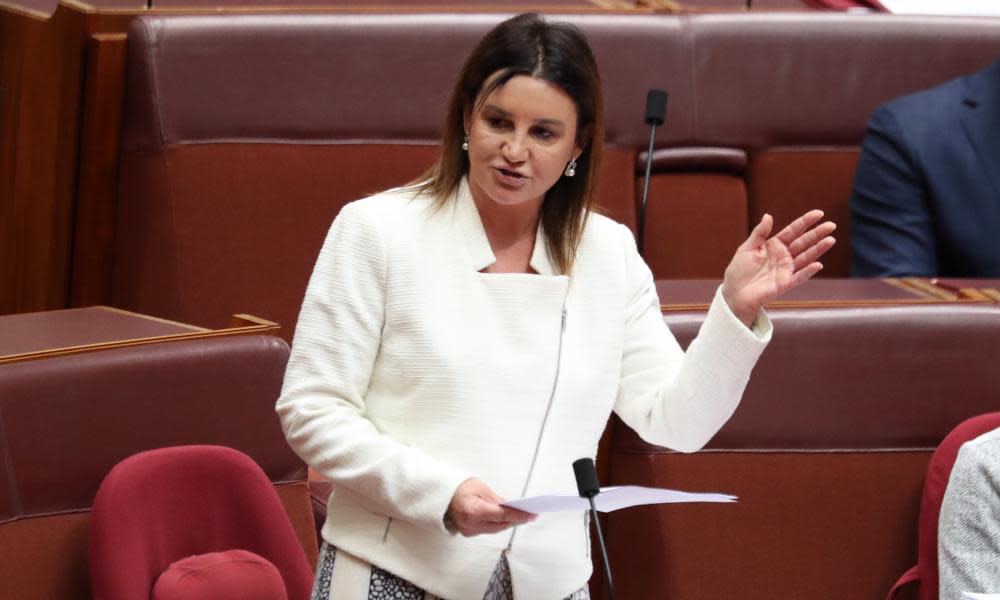'Win for lobbyists': number of sponsored passes for parliament doubles in seven years

The number of lobbyists with unfettered access to the halls of Parliament House to see politicians, staffers and journalists under the sponsored passholder scheme has nearly doubled in the last seven years, Guardian Australia has learned.
In addition to parliamentarians, their staffers, building employees and the press gallery, there is a separate category for sponsored passes where people, often working as lobbyists, can enter and exit the building through the private entrances, and not need an escort through the non-public parts of the building.
The passes are sponsored by MPs and senators, and although the orange passes are not limited to lobbyists, a significant proportion of those issued would be to groups lobbying in parliament.
Related: Errors and delays in government register masks identities of corporate lobbyist clients
The independent senator Jacqui Lambie described the passes as a “win for lobbyists”.
“Having that orange lanyard lets them roam free around Parliament House unescorted. It lets them ‘bump’ into ministers at Aussies cafe, or ‘drop in’ to visit MPs and senators in their office,” she said.
The number of these passes issued has boomed in the last few years. In 2012, the number of the much sought-after orange passes issued was 1,267. The president of the Senate, Scott Ryan, has confirmed there are now 2,380 people with sponsored passes able to roam the halls of power unabated.
The figures came in response to a question in the Senate from the Centre Alliance senator Rex Patrick. Guardian Australia had previously asked the Department of Parliamentary Services for a list of who has been provided orange passes since the election, but the request was refused.
The Department of Parliamentary Services is also exempt from Australia’s freedom of information law.
DPS argues there isn’t a specific category when someone is signing up for a pass to identify them as lobbyists, and the orange pass is also provided to people from not-for-profits, banks, religious groups, universities, unions and people on diplomatic missions.
When pushed in 2017 the department was able to break down the total orange pass figures of 1,710 that year, showing the majority – 1,543 passes – were given to people with a “significant and regular” business requirement for unescorted access.
Lambie said “significant and regular business” is what she would call lobbying.
“What else would they be doing?”
The freelance journalist William Summers attempted to get a list of the organisations that had employees that hold orange passes in 2018, but was similarly rejected by DPS.
The secrecy surrounding which lobbyists have access to parliament puts Australia at odds with the United States and New Zealand, which publish lists of the lobbyists with access to parliament. In 2017, for New Zealand, the total number of registered lobbyists was just 93.
In Australia, the Attorney-General’s Department maintains a lobbyist register, but that doesn’t reveal which lobbyists have access to parliament.
Lambie said the rise in the number of passes being issued was “shocking” and said it was even worse because the government keeps secret who holds those passes.
“There are fewer than 600 people on the government’s lobbyist register – less than a quarter of the number of people who hold an orange pass,” she said.
“The details of people who hold orange passes should be published and the rules updated to include in-house lobbyists.
“Most importantly, we need an independent regulator that can crack down on lobbyists and politicians who do the wrong thing.”
A Grattan Institute report last year found the lobbyist register was too narrow in its definition of lobbyists, and recommended the register should be linked to people who have orange passes in parliament.
Related: Christopher Pyne's firm lobbies for company that won $2.7m in defence contracts
“Linking the register of lobbyists to sponsored (‘orange’) passes would broaden the definition of lobbyist without making it unmanageable,” the report stated.
“The burden to register as a lobbyist should be negligible. Orange passholders would simply need to declare who they are lobbying for and the portfolio areas they are lobbying in, as part of the existing application process.”
The Grattan report noted that while some people holding orange passes might object to the label of “lobbyist” – such as academics – it would still show who is attempting to influence people within Parliament House.
In 2017, the then Senate president Stephen Parry defended the decision not to disclose the list of people holding such passes, arguing it was a security threat because someone might try to steal a passholder’s identity to access Parliament House.
“If you get someone who wanted to identify themselves as a passholder, they could create a likeness to a passholder, steal the pass, do harm to the person of the pass they’ve stolen and then enter this building,” he said.
“That’s a potential risk.”

 Yahoo News
Yahoo News 
